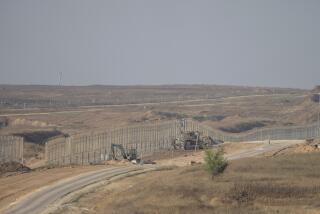Mortar attack kills 7 inmates in Baghdad
- Share via
BAGHDAD — Seven inmates were killed Monday when mortar shells slammed into an Interior Ministry jail here, Iraqi security officials said. A few miles south, fire broke out at one of Iraq’s main oil refineries, a possible case of sabotage.
There were conflicting reports about the cause of the blaze, but police said a Katyusha rocket hit a gas tanker.
More than 450 attacks have been carried out against Iraq’s oil installations or industry employees since the U.S.-led invasion in March 2003, said analysts who monitor security issues related to energy. Attacks occurred Friday and Saturday in the northern oil hub of Baiji.
Police, meanwhile, announced the arrest of four suspects in the weekend assassination of a popular police chief in the southern province of Babil.
Maj. Gen. Qais Hamza Mamouri and two bodyguards were killed Sunday in Hillah, capital of the predominantly Shiite Muslim province, after a bomb hit his convoy. The suspects, police said, were found to have significant traces of explosives on their bodies.
In the northern city of Kirkuk on Monday, a police colonel and two officers were killed when gunmen opened fire on their convoy. In Baghdad, the manager of the Rashad mental and psychiatric hospital was gunned down while driving home.
The violence was the latest reminder of the dangers Iraqis continue to face, despite significant security improvements throughout the country in recent months.
As the nation on Monday observed Human Rights Day, an annual international event, some Iraqis said they felt only slightly better off than when Saddam Hussein ruled Iraq.
Key concerns include the treatment of detainees, growing violence against women and the fear of speaking out openly on political matters for fear of sectarian retaliation -- issues that underscore the unfulfilled goal of the invasion: bringing Iraq greater freedoms.
“Before 2003, there were [human rights] violations, but not like the violations we are seeing today,” said Omar Jabouri, human rights advisor to Vice President Tariq Hashimi, who has been an outspoken critic of the treatment of detainees since the start of the war.
Jabouri said about 32,000 people were being held by Iraqi security forces. The number being held by U.S.-led coalition forces is 25,500, according to the U.S. military
U.S. military officials say they have gone to great lengths to eliminate abuses at their detention facilities in Iraq.
Jabouri said Hashimi had proposed to the Iraqi government that most detainees be pardoned.
Said Arikat, a Baghdad-based spokesman for the United Nations Assistance Mission for Iraq, said in a written response to questions that “marked improvements” had been made in the last three or four months on the status of detainees in Iraqi prisons, “resulting from efforts by the judicial authorities to streamline and speed up the review of detainees’ cases.”
However, he noted that overall, “the current human rights situation in Iraq remains of serious concern” to his agency. He said the issues included extrajudicial executions, assassinations, targeted and indiscriminate killings of civilians by insurgents and armed militias, the killing of civilians during military operations conducted either by multinational forces or Iraqi security forces, and the killing of civilians by contractor employees.
Arikat also highlighted the plight of the thousands of displaced Iraqis, and the problem of violence against women.
In recent months, police officials in the southern city of Basra have reported the killings of dozens of women by religious vigilantes because the victims wore makeup, or were not dressed in a hijab, a traditional Islamic dress that covers the head and body.
The reported attacks, including mutilations and beheadings, could not be independently confirmed.
Women in Basra have also been targeted because of their professions, said Baghdad lawyer Tameem Azzawi, a member of the Iraqi Women’s Network.
“It’s worse now than before 2003,” Azzawi said. “Iraqi women are facing an unprecedented level of violence.”
Azzawi said a group of male and female students was beaten up recently for hanging out together at a park. “News is coming to us all the time that there is a semi-ban on girls and boys mixing,” Azzawi said.
Before the U.S.-led invasion of Iraq, Basra, the country’s second largest city, was known for its religious tolerance and thriving night life.
On Monday, there were banners on several walls throughout the city declaring that wearing “makeup, and no hijab, is forbidden,” said Basra-based lawyer Suaad Dallo.
Arikat, the U.N. official, said his agency had received a number of reports about attacks on women by extremist groups, but had been unable to follow up on them “due to security concerns on the ground and the absence of UNAMI personnel in southern Iraq.”
Jabouri, the human rights advisor to the vice president, said Iraqi security forces had tried unsuccessfully to stop such violence against women.
The solution, he said, would be for the Shiite Muslim religious parties and elders to issue a fatwa, or order, for an end to such attacks.
On Sunday, in a speech addressing human rights, Iraqi Prime Minister Nouri Maliki said dictatorship was a thing of the past.
“This culture has started to fade,” Maliki said. “It started to change when Iraq was opened politically” and started enjoying democracy, elections and a new constitution.
“Our constitution came dedicated to human rights in a very obvious and certain manner,” he added. “This is one of the qualities that we can be proud of in the new Iraq: human rights. . . . We are essentially in a genuine stage of transformation.”
Times staff writers Wail Alhafith, Saif Rasheed, Usama Redha and Saif Hameed in Baghdad and special correspondents in Hillah and Kirkuk contributed to this report.
More to Read
Sign up for Essential California
The most important California stories and recommendations in your inbox every morning.
You may occasionally receive promotional content from the Los Angeles Times.











